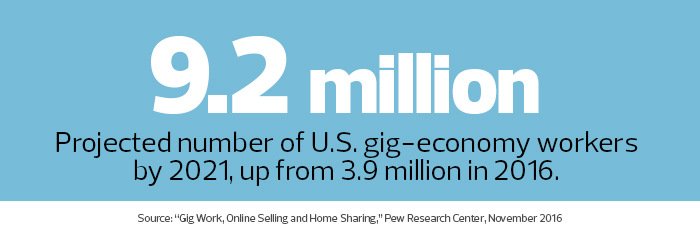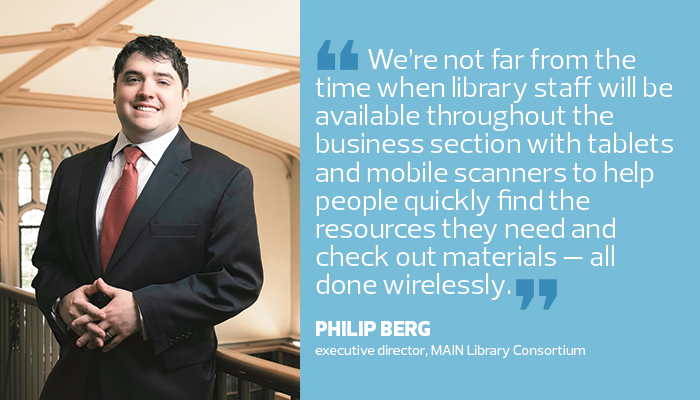The Gig Economy Gets a Boost Thanks to Public Library Tech Upgrades
Morris County, N.J., lies about 25 miles west of New York City, offering affordable suburban living in the shadow of Big Apple enterprise. The proximity may fuel aspirations and dreams, making northern New Jersey a popular place to start a business or work remotely.
To keep pace with regional residents’ expectations, 38 public libraries in Morris, Somerset and Warren counties banded together as a consortium, the Morris Automated Information Network. MAIN invests in technology upgrades that benefit the community, while keeping an eye on workers who may seek to establish themselves locally rather than commute to the crowded city.
Chad Leinaweaver, director of the Morristown & Township Library (a MAIN member), sees these business aspirants on a daily basis.
For the past few years, a pair of videographers have turned to the Morristown Library’s business facilities, using the library’s Wi-Fi network and conference rooms to edit clips, assemble stories and send finished reports to their editors to cover local news stories for a broadcast news agency.
“The library acts as a central meeting location that helps the freelancers meet their production deadlines and keep in the loop for new assignments,” Leinaweaver says.
The videographers are part of a growing economic force. Freelance graphic designers, food truck chefs, app developers and crafters of organic personal care products are among those who work as part of a thriving subset of local economies across the country. The number of those gig workers — independent contractors and contingent workers — rose from 10.7 percent to 15.8 percent of the U.S. economy from 2005 to 2015, according to the National Bureau of Economic Research.

Such microbusinesses may have small budgets, but their appetite for technology and business management expertise is huge. In response, a growing number of public libraries are catering to that dynamic economic force, offering specialized workspaces, and in the process, redefining (again) the role of libraries in the digital age.
SIGN UP: Get more news from the StateTech newsletter in your inbox every two weeks!
New Jersey Libraries Stock Up with Tech for Freelancers
The libraries within the MAIN consortium take the business-mentor role to heart. Some have established meeting rooms equipped with computers, Wi-Fi networks, videoconferencing capabilities, printers and other business essentials. MAIN makes group purchases for members, and passes on the hardware and software costs without a markup. Its three-person IT staff then images and installs computers and provides hardware support for five years, reducing staff expenses for individual libraries. Libraries that choose to join MAIN contribute to its $1.2 million operating budget.
“By pooling library resources, the consortium gains leverage when negotiating with IT vendors,” says Phillip Berg, MAIN’s executive director. “We make it possible for libraries to buy technology that would ordinarily be out of their price range.”
The latest project brought 36 Cisco Meraki MX64 and MX84 firewall appliances to members, an implementation that includes a Cisco maintenance contract and a cloud-based, centralized management application for network administration.
“We have a lot of severe storms in northwestern New Jersey, so dealing with power outages is an ongoing issue,” Berg says. “Centralized administration enables us to view the status of the various firewalls without having to log in remotely.”
In addition to networking gear, MAIN also recently purchased Dell OptiPlex desktops and Latitude laptop computers, and HP LaserJet Pro M402 and Color M452 and M477 printers. Those new desktops provide ready workstations for freelancers like the news videographers editing clips at the Morristown Library.
For the future, the MAIN staff is evaluating wireless receipt printers and barcode scanners that will allow library staff to “cut the cord and get out from behind the desk,” Berg says. “We’re not far from the time when library staff will be available throughout the business section with tablets and mobile scanners to help people quickly find the resources they need and check out materials — all done wirelessly.”
Texas Libraries Embrace a Tech-Focused Use of Space
New Jersey libraries aren’t the only ones responding to the growing gig economy. A similar effort is underway at the Dallas Public Library, where bookshelves covering 25,000 square feet of the main library were removed to make room for meeting spaces and shared business equipment.
“I’m sure I gave multiple librarians heart attacks when we did this,” says Mary Jo Giudice, the library director and renovation master.

Bookshelves weren’t the only things to go; rules against food and drink also went by the wayside. One new program allows young developers to show off their latest apps and receive feedback from peers, with beer served afterward.
“We’re stepping out of the box of most people’s perceptions of a library,” Giudice says. A fresh approach to library services directly benefits gig workers. A November 2017 report on gig economy trends from the National Association of Counties advises local governments on how to support gig workers, and one way they can surely do so is by providing them with a comfortable and flexible physical space in which to work.
The Dallas Public Library’s gig resources are part of the new Sammons Small Business Center, co-founded with the city’s Office of Economic Development and a contribution from Sammons Enterprises, a diversified holding company with roots in the Dallas community. Taking up the remodeled fifth floor of the main downtown library, the business center provides comfortable working spaces equipped with four-seater tables, conference rooms and a variety of core technology capabilities, including Wi-Fi access, Dell desktop PCs and Chromebooks, scanners, and other tools.
Dallas Libraries Provide Businesses with a Place to Grow
The Sammons Small Business Center gives Dallas-area gig workers access to desktop computers, conference space and tabletops, but it also provides them with other resources. Library patrons can book meetings to talk with clients and partners, borrow laptops for business communication and scan documents to cloud-based accounts like Google Drive.
Those interested in learning new skills and keeping up with industry and customer trends can access educational materials at the center. Gig workers, as independent contractors, also can use business planning software and more to support their growth through the Dallas Business Resource and Information Network, ultimately fulfilling the goal of the Sammons Small Business Center to support entrepreneurs in Dallas.
Giudice says the Dallas Public Libraries didn’t have a unique advantage for rolling out services tailored to gig workers. “I feel like it’s an easy, replicable process for other public libraries,” she says. “You just need space and the ability to build relationships. Then, relax your old, library-esque rules and let local gig workers know what you can offer them.”









